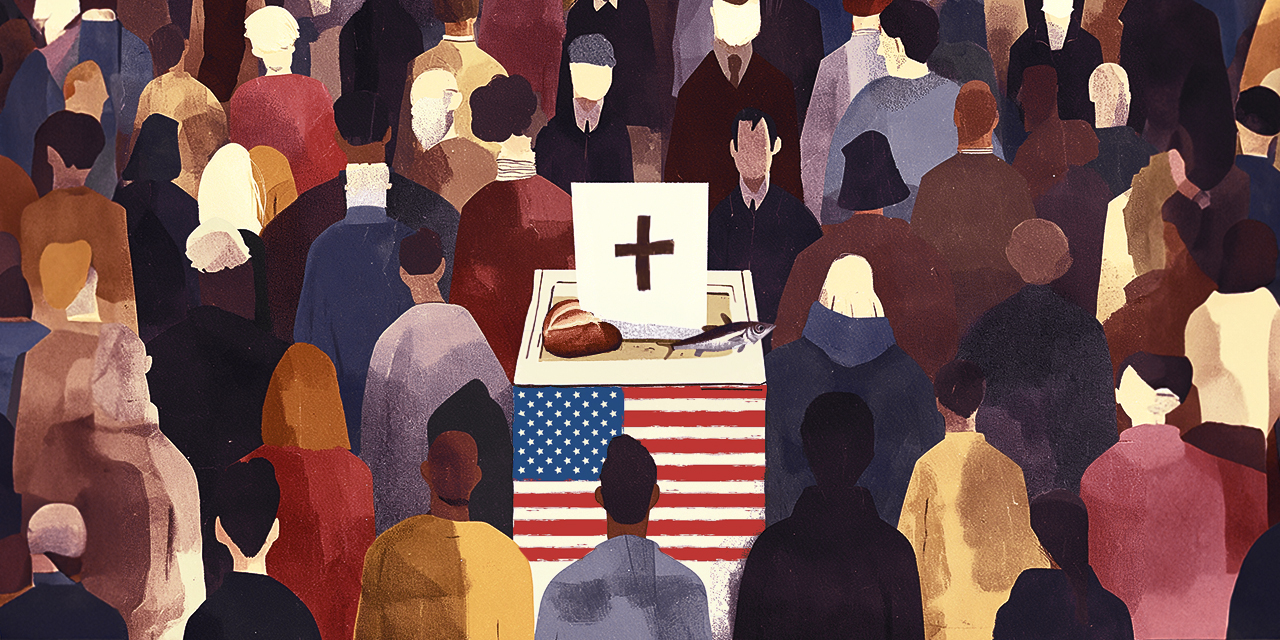By Bishop Emeritus David W. Kendall
Tuesday, Nov. 5, I would love to go to the high school where we vote, enter behind the curtain and place an emphatic X beside the name: “JESUS!” If only we could nominate, vote for, and elect Jesus as our president! Right?
Whatever our political persuasion or party, I am sure we would all like to vote for a candidate who is truthful to the core, who knows what is needed, especially when we’re uncertain, and can take us there, with a track record that inspires utter confidence. Imagine a government formed by such a leader! Well, who better than Jesus, our Lord and Savior? I suspect many of us would be eager to support Jesus for president. Of course, “king” would be the better term, at least for the gospels who introduce Him to us. But let’s think carefully and proceed deliberately!
Throughout the gospel record, Jesus is described in royal terms, as truly worthy of executive leadership anywhere and anytime. Once, in fact, the people surged toward Him intending to install Him as king by force (John 6:15).
Let’s Make Jesus King!
It happened after John’s account of Jesus feeding thousands of people by multiplying five loaves of bread and two small fish. All the gospels include this story, but in John’s telling the focus differs. In Matthew 14, Mark 6, and Luke 9, large crowds gather to hear Jesus’ teaching and receive His ministry of healing. All day long the people came, and Jesus teaches and heals those in need. Then the disciples tell Jesus to dismiss them, so they have time to go and find food before it gets too late, too dark, and too dangerous.
_
“Jesus announces His plan and then works His plan.”
_
But in John’s telling, when Jesus sees the large crowds forming, He asks Philip where they could buy enough bread to feed all those people. It was a test, John says, because Jesus already knew what He was going to do. The other Gospels focus on the need of the people after a long day of being there. John focuses primarily on Jesus who feeds the crowds, in an utterly miraculous way, to reveal who He was, why He came into the world, and the way He would accomplish what His Father sent Him to do.
From all the Gospels, we know Jesus came to meet the various needs of the people, but also to form a government — the kingdom of God. He came to offer a way of being human and living together in a community that is good and beautiful, that is meaningful and joyful, and that receives blessing and shares blessing with others. Jesus wants to form followers into a community who share solutions instead of simply suffering from the same problems that plague the whole world. Incredibly, as the feeding miracle demonstrates, Jesus wants to empower them and multiply what they have to offer, so that it does more, helps more, and blesses more than ever possible otherwise.
But notice Jesus does not make the kind of promises we expect to hear from politicians running for office: He doesn’t promise to eliminate hunger, illness, sickness, and accidents — nor to rid the world of all its evils with a snap of His divine fingers. Rather, Jesus announces His plan and then works His plan. In John’s account (John 6) He asks them to join him as He provides food for the masses. Of course, they themselves are no match for the enormity of such need. But the whole conversation is a setup because Jesus wants them to see what He will do with their help. Indeed, Jesus receives five loaves and two fish, blesses them, breaks pieces off and begins distributing to the disciples and then to others throughout the vast crowd until all have had enough and more. At the end of the day, there were 12 baskets of leftovers to go.
Again, Jesus makes no promise about lunch the next day as if He’d established a free lunch program as the new norm for His people. Instead, everything returns to the way it was before, with one huge exception. Now they have Jesus as a new center of attention, and an opportunity to trust Jesus for tomorrow’s needs along with everything else in their lives and world. It was enough to convince many in the crowd to rush forward, seize Jesus, and install Him as their King.
As I‘ve said, I can identify with these crowds. Who could be better? Imagine all the good Jesus might do if only given the opportunity, if He were granted access to the places where the right person could get the right things done? All the more so since Jesus is far superior to even the best of human kings.
Yet, in effect, Jesus says, “No way!”
Why Does Jesus Say “No”?
Part of the answer can be seen in the background of Jesus’ ministry. As the Bible’s story opens, we read, “In the beginning … God!” Thus, once upon a time, there was no king, other than God. God was King without peer or rival. Incredibly, though, a time came when God’s own people begged for another king. They were saying to the Lord their God, “We don’t want You to be our King; we want You to give us a king, like all the other nations.”
God let them have a king but warned them it wouldn’t turn out the way they thought. So Israel had their kings for a few hundred years, and then it ended badly. It ended in exile, with the loss not only of king but also nation, temple, land, provisions, protections, and their Lord’s companionship! It ended with the loss of all God had promised them for thousands of years!
So, in the background of the story of Jesus, multiple times the people had demanded and made for themselves their own kings. But it didn’t go well for them. In fact, it was a serial disaster. As Jesus saw them coming to make Him king, He could well have thought: “Here they go again!”
_
“Hence, if it is good to be a king, some would argue it might be better to be a kingmaker.”
_
Which hints at another reason Jesus says “no!” If someone makes you king, you will owe them. You will have to make sure you take care of them, in a way that acknowledges how important they are. To some degree you will owe them, and they will own you. Hence, if it is good to be a king, some would argue it might be better to be a kingmaker, the One who makes the king the king.
Jesus had not come to add to the long list of failed attempts of the people to decide for themselves who their king would be and what their king would do for them. Jesus refused to be made their king because He already was the King. Indeed, the God they once called King had in Jesus become flesh to live among them and form them into the kind of kingdom and people God had always intended. But will the people receive Him for the King He is, in ways appropriate for the kingdom He is forming? Sadly, no. In fact, when this episode closes, nearly all but the 12 disciples have departed, no longer wanting Jesus to be King (see John 6:66–69).
Jesus refused their crown because He already was their King. He did not need vetting, political party, armies, finances, or any other things on which most leaders and governments depend. He needed time to reveal and manifest His royalty, and to create opportunity for all may to be drawn into His royal movement — which could happen once Jesus fought the battle and defeated the dark powers that oppose His right to rule.
Jesus refused their crown because everyone who wanted Jesus as King had a religious, political, and social agenda, a platform to which they were committed. They were bringing their agenda to the One they thought would make a good king — the one who would accomplish their plan. Among other things, they wanted a king who would destroy or remove the Romans — those accursed foreigners. They sought the removal of their corrupt religious and civil leaders who used power for their own benefit. Finally, they desired full bellies, healthy bodies, and bumper crops.
But Jesus was not, and is not, that kind of King. And Jesus has His own agenda!
_
“What Jesus offers is Himself.”
_
Jesus: What Kind of King?
As we follow the story John tells, Jesus reveals the glory of His kingship and the way His kingship becomes real for His followers and their world. Feeding all those people reminded the crowds of the time God fed His people manna in the wilderness. Jesus tells them His feeding them was a little like what happened with Moses, but far more (see 6:31–32)! In fact, multiplying the bread and fish was a sign that what God was really offering is Jesus. Jesus is the bread, and Jesus is the drink! If anyone eats … and drinks … they will belong to the coming kingdom of God, and they will have eternal life (6:35, 47–48, 51). Even now God offers them eternal life because Jesus brings eternity with Him.
What Jesus offers is Himself. Those who eat His flesh and drink His blood, will live eternally and participate in His Kingdom rule. Shocking words, to be sure. Many thought them strange, if not gross, obscene, or insane (6:52). Jesus helps them a little by assuring them that “eating His flesh and drinking His blood” is figurative language, not literal (6:63).
But to call it “figurative” does not blunt the radical assertion Jesus is making: We must receive what God offers us in Jesus like we do the food we eat and water we drink. We must take Jesus in and savor the Lord — the King — that He is. We must digest, metabolize, draw nourishment from Jesus. His words, His deeds, His way of thinking, feeling, acting, and responding offer a different way of life. We must take Him in, and live on His terms, in every way possible.
As the story later unfolds, Jesus’ assertions astound all the more. He says I AM the bread of life God gives you from heaven; the Light of the world; the gateway and pathway to God and all the good God provides. He says I AM the Good Shepherd who defends and protects the sheep at the cost of my own life. I AM the way, the truth, and the life. I AM the resurrection and the life. I AM the True Vine from which life itself flows! And, at times, Jesus simply says: I AM! In short, Jesus is claiming to be everything and offer everything. At the center of the kingdom stands Jesus, all that He is and all that He does as the King God has sent for His people and the world.
_
“His way of life establishes a kingdom in this here-and-now-world that bears much fruit.”
_
Finally, and most shockingly, Jesus reveals how He will achieve His glorious victory and share it with the peoples of the world:
“Unless a grain of wheat falls into the earth and dies, it remains alone; but if it dies, it bears much fruit” (John 12:24 RSV).
“If I am lifted up from the earth, I will draw all people to myself,” and John notes that “He said this to indicate the kind of death he was about to die” (John 12:31–33 ISV).
The supreme revelation of Jesus’ royalty is His self-sacrificial love that leads to the cross and then to His resurrection. He is the King who, by His own experiencing and conquering of death, establishes that kingdom for which all people most deeply long. He is the King whose way is the rule of self-sacrificing love over us, among us and through us.
Ultimately, He could not accept even the sincerest efforts of people to make Him King because He already was the King. His way of life establishes a kingdom in this here-and-now-world that bears much fruit: the first fruits signaling God’s new creation of the world, its peoples, and its governments.
Once Again: Jesus for President?
Without thinking and praying through the story of Jesus our Scriptures tell us, we might gladly nominate Jesus expecting Him to embrace and accomplish our agenda. As in the Gospel, though, Jesus will have none of that! He is already the King who alone can form the government of God. His government alone brings the whole world and its people what is good, beautiful, and true.
_
“Jesus calls for followers who live His way and depend on His wisdom and power day in and day out.”
_
King Jesus accomplishes this His own way, as any King typically does. So how shall we respond to His agenda and platform?
Consider: Jesus does not need to be elected to rule His way over our lives and our land. Jesus does not need to win any election. Nor does He need any candidate’s election so that His way can prevail in the land. Thus, on one hand, Jesus has no stake in the outcomes of any given election. On the other, Jesus as King stakes everything on His followers actually following Him in His way, before, during and after all elections to come and beyond.
Jesus calls for followers who live His way and depend on His wisdom and power day in and day out. He calls His followers to live as though His way is the only way, and His character and heart are what they most deeply need for themselves, their friends, and the world.
Indeed, He invites us all to pursue His priorities, plans, and purposes above all, in the way that Jesus pursued them. As we follow Him together in such ways, Jesus will rule.
Electoral Process as “Means of Grace”
I suggest that the electoral season (from now to Nov. 5) could become a season of spiritual seeking and discovery, an opportunity to root ourselves more deeply in His way. Not only to cultivate more godly living personally and relationally, but to trust that by becoming ever more like Him, we are offering a bit of bread and fish. This might seem like nothing in the face of our world’s need, including the social, cultural, and political needs so pressing around us. Even so, a bit of bread and fish in the hands of King Jesus can still accomplish above and beyond anything we now envision!
+

Bishop Emeritus David W. Kendall, Ph.D., is a member of the Study Commission on Doctrine. He served in the office of Free Methodist bishop from 2005 to 2019. He is the author of “Questions Raised by the Story,” “God’s Call to Be Like Jesus,” “Follow Her Lead” and “Prayers for the Seasons.”










